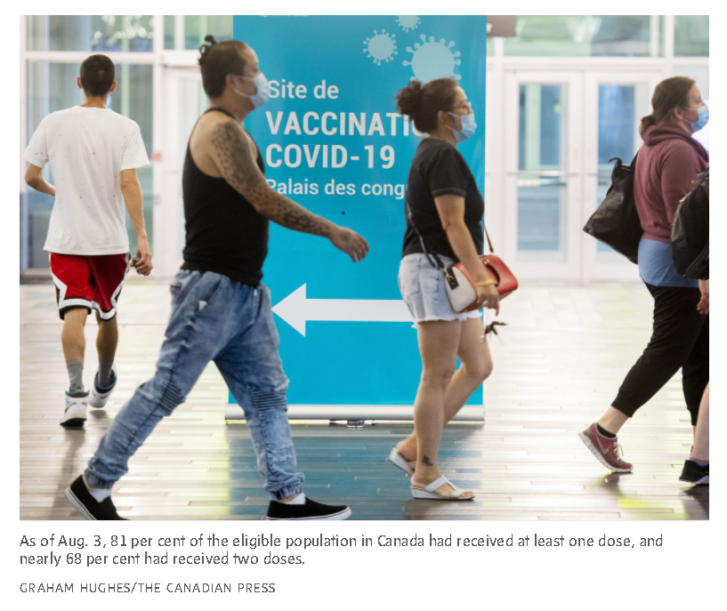Healthy Canadians don’t yet need a third dose of a COVID-19 vaccine, according to experts who say extra doses should instead be given to poorer countries that lack vaccines.
The debate over whether to administer booster shots in Canada has intensified in recent weeks as countries such as Israel, France and Germany move ahead with plans to offer third doses to certain groups, and vaccine manufacturers suggest third doses offer greater protection against illness.

Quebec is offering a third dose to people who want to travel to countries that don’t recognize them as fully vaccinated unless they received two doses of the same vaccine. Meanwhile, the World Health Organization is calling for a moratorium on boosters at least until the end of September to ensure every country can vaccinate at least 10 per cent of its population.
Although specific groups, including long-term care residents and those with health conditions such as end-stage kidney disease, may benefit from a third dose, there’s little evidence to justify giving booster shots to healthy people who have received two doses, experts say – especially when many countries are still unprotected.
“Most of the science says that if you’re healthy and you’ve had two doses at this point in time, Canada doesn’t need dose three,” said Dr. Tania Watts, a professor of immunology at the University of Toronto.
As of Aug. 3, 81 per cent of the eligible population in Canada had received at least one dose, and nearly 68 per cent had received two doses. Canada is among the leading countries for vaccinations against COVID-19.
Last week, Moderna Inc. said it expected a booster dose of its mRNA COVID-19 vaccine will be necessary this fall as antibodies are likely to decline. Similarly, Pfizer has also said it anticipated a third dose of its mRNA vaccine would be needed, as data from the company suggested a third dose boosts antibody levels higher than two doses against the Delta variant.
But the data from both companies show the vaccines continue to work well six months after the second dose, said Anna Blakney, an assistant professor of biomedical engineering at the University of British Columbia, whose research focuses on mRNA vaccines.
Moderna’s data showed its vaccine remained 93 per cent effective against COVID-19, and 98 per cent and 100 per cent effective against severe illness and death respectively. Data on Pfizer’s vaccine, released last month in a preprint paper that has yet to be peer reviewed, showed the efficacy of its vaccine against symptomatic cases dipped to 84 per cent at four months, after peaking at 96 per cent in the two months after a second dose. Overall, the vaccine was 91 per cent effective during six months.
“That shows that the protection does last for a while,” Dr. Blakney said.
Even if new variants of the coronavirus emerge that are able to more easily elude vaccine protection, Dr. Blakney said it’s unlikely a new mutation would suddenly render the vaccines entirely ineffective. Besides, she said, it’s relatively easy to change the design of mRNA vaccines and make new ones quickly.
Jorge Fritz, an associate professor in the department of microbiology and immunology at McGill University, said he anticipated people will likely need a third dose eventually. The question is whether they will need the same vaccine or a modified one, he said.
It’s also still unknown when that will be necessary. Scientists are still trying to define what’s called the “correlates of protection,” meaning the measurable signs, whether they’re specific antibodies or T-Cell response, that indicate how well someone is protected from the coronavirus, he explained. (T cells perform tasks such as killing off virus-infected cells and alerting other parts of the immune system to make antibodies.) So determining when to give third doses may take some time, Dr. Fritz said.
Meanwhile, Canada should donate its surplus vaccines to COVAX, the non-profit program that supplies low-income countries, said Steven Hoffman, director of the Global Strategy Lab and a professor of global health, law, and political science at York University.
“The most selfish thing a government could do right now is implement third doses when so much of the world hasn’t had their first dose yet,” Dr. Hoffman said.
As of late last month, Canada had a total of 66 million doses, enough to fully vaccinate every eligible person in the country. In an e-mail last week, Health Canada said vaccines will still be needed for newly eligible populations, such as children under 12, who have not yet been approved for vaccination, and new arrivals, and possibly as the virus and the science evolve.
The national rate of vaccine wastage while under the federal government’s care has been minimal, Health Canada said. It is developing options for potential donations of unused doses in the months to come, it added.
Dr. Hoffman said countries should not wait until vaccines are close to expiry to donate them.
“Those donations then become a Trojan horse whereby on first glance it looks generous, but actually it just transfers the accountability for wastage to poor countries that frankly have less capacity to quickly make use of them,” he said.
Article From: Globe and Mail
Author: WENCY LEUNG

